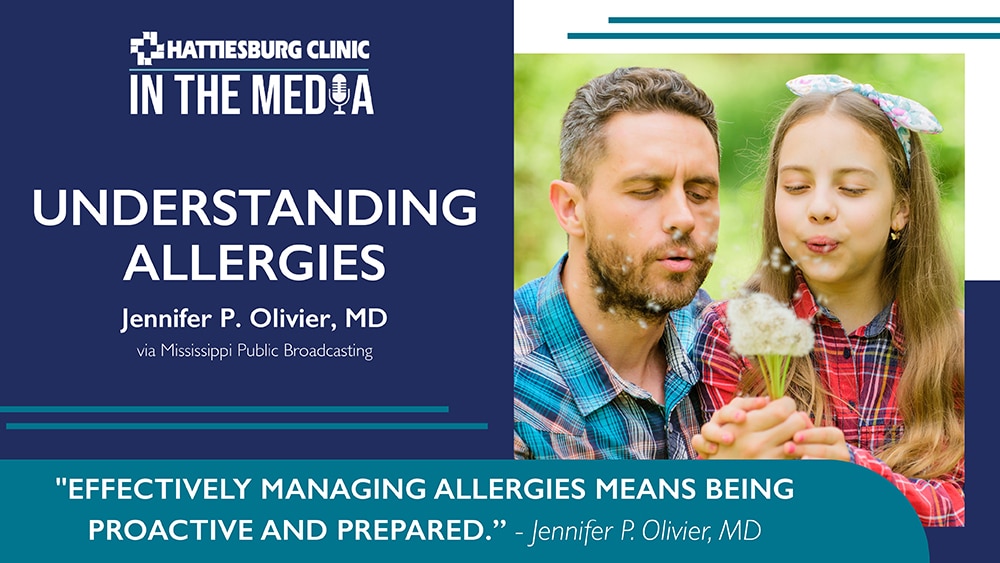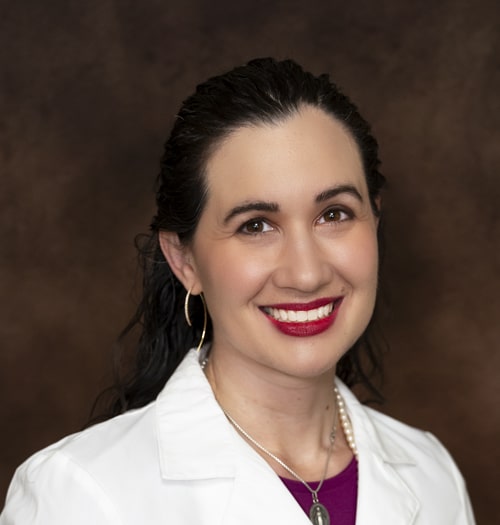Allergies: Symptoms, Diagnosis and Treatment
Millions worldwide suffer from an allergy that may affect their skin, lungs or sinuses. According to the Asthma and Allergy Foundation of America, 30 percent of adults and 40 percent of children may be affected by allergies.
Allergic reactions are an “illogical” immune response to harmless things like pollen, food or drugs. When the immune system recognizes these allergens as a threat, it sparks a series of reactions that cause sneezing, itching, rash or hives, watery eyes, diarrhea and vomiting or even shock as a defense mechanism. Allergies can develop at any age and may be influenced by genetics or environmental exposures.
Jennifer P. Olivier, MD, with Hattiesburg Clinic Allergy, Asthma & Immunology – Picayune, offers testing and treatment options for pediatric and adult patients struggling with an allergy or primary immune deficiency. “A proper treatment plan is not only crucial, but necessary to ensure best outcomes when managing chronic allergic sensitivity or immune deficiency,” Dr. Olivier said.
The first step in identifying a specific trigger is testing, in which allergens can be identified with skin or blood tests. Accurate identification of triggers is essential for effective management and prevention of potentially life-threatening reactions such as anaphylaxis. Anaphylaxis is a medical emergency that may include symptoms such as difficulty breathing, sudden drop in blood pressure, loss of consciousness and death.
“Effective management requires open communication, compliance with office visits and an understanding of therapeutic options,” Olivier said. “Being proactive is vital for a better quality of life and overall well-being.”
Treatment options will depend on the type of allergy being treated but may entail a multifaceted approach including trigger avoidance, medications or allergy shots. With the assortment of treatment options available, it is important to consult an allergist who is an expert in guiding patients towards the best therapy for their lifestyles. Allergists can provide the specialized care required for a thorough evaluation and treatment plan.
Olivier recently spoke to Mississippi Public Broadcasting and shared some tips to help patients handle allergies. “I always recommend starting with saline and an over-the-counter intranasal steroid spray, such as Flonase. Those are your first line treatments,” Olivier said. “And if you are really struggling, see an allergist and immunologist to truly get an individualized treatment plan and a better quality of life.”
To listen to Olivier’s full interview, follow the link, starting at 17:00: http://mississippiedition.mpbonline.org/episodes/07152024-rnc-kicks-off-redistricting-allergies-in-summer
To learn more about Olivier and all services offered, please call (769) 717-5005, or visit www.HattiesburgClinic.com/Picayune.
###
About Hattiesburg Clinic Allergy, Asthma & Immunology – Picayune:
Hattiesburg Clinic Allergy, Asthma & Immunology – Picayune provides specialized care through testing and treatment of allergies and asthma in pediatric and adult patients. Our providers focus on evaluating, diagnosing, treating and managing abnormal immune system responses that cause allergies and asthma.
About Hattiesburg Clinic:
Hattiesburg Clinic is Mississippi’s largest privately-owned, multispecialty clinic. More than 60 years after its beginning, the clinic has grown to over 450 physicians and providers, caring for patients in more than 17 counties in South Mississippi. Along with over 2,500 professional staff employees, these physicians and providers come together for a common purpose, to serve the over 500,000 community members who live and work in South Mississippi every day.

